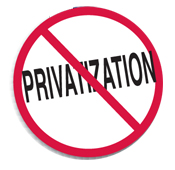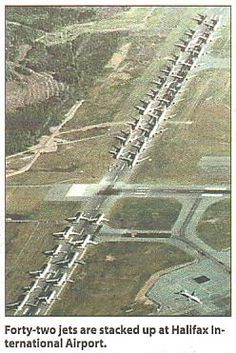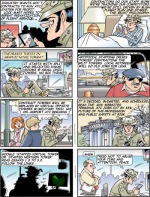In previous posts, we’ve examined how NATCA’s priorities in Privatization are distinctly different from a controller’s priorities, and we’ve also considered how the NATCA-endorsed privatized ATC system might have responded on 9-11.
In this post, let’s talk about the Economic Impact of Privatization. Industry is very quick to claim that Corporations are Efficient, and that free markets make the most efficient allocation of resources. So very often, though, corporations’ key competency is moving expenses off their balancesheets and onto third parties, and keeping the profitable aspects of the total transaction for themselves.
For an example: airlines have determined that it’s cost-effective for them to operate schedules that delay the American flying public by millions of hours each year. The airlines do not feel the cost of that decision; it’s moved onto the public. The airlines do reap the economic benefits of a cost-justified operating schedule.
So when we say that a Privatized ATC function is going to be more efficient, let’s not look at the minor items like staffing tweaks and reduced management; let’s look at the bedrock marketplace that’s going on, and how privatization affects it.
Who owns the airspace? The answer is: the American people. It’s sort of like: who owns frequency spectrum management? Who owns the shipping channels in the Mississippi River?
Who has paid for the existing aviation infrastructure? The American taxpayer.
Who is American aviation supposed to benefit – the people (narrowed perhaps to Taxpayers, or the FlyingPublic) or the the corporations (airlines and vendors)?
We have a significantly lassez-faire aviation transportation system. We operate on first-come, first-serve. You want to fly your small-business jet into LasVegas or SFO – you can do that, it’s a public-use airport accessed by first-come, first-serve.
There are just a few airports with slots systems, in which individual airlines “own” the right to land a certain number of planes per hour. We can discuss that later; in general, the American aviation system is just like the American highway system – anybody can choose to operate in it, where they want, when they want. That’s a significant philosophy. It’s sort of American.
Access to the aviation system, access to the route structure, access to the airports is an unregulated economy (since 1978). There are public goods, Industry would like to profit from the public’s investment, and the metaphor of the Tragedy of the Commons applies.
Airlines are routinely scheduling key airport operations at hourly rates that are not sustainable during bad weather. They do this to maximize the use of their assets, distributing their fixed costs over as broad a spread as possible. But when it rains, or snows, or there’s thunderstorms – there’s too many airplanes scheduled to go flying.
The FAA does not pre-control the market for the route structure or for airport landings. However, when demand (flights) exceeds capabilities (runways), the FAA slows down the problem. They don’t want to stop the flow completely; the goal is to slow it down to a rate that’s safe and sustainable in actual conditions.
And in the middle of that Airline-Airport-Airway economy, that allocation of precious resources, Pat CEO who owns a small manufacturing company can fly her BizJet into the metro area and that one BizJet probably means one less airline operation that hour.
The airlines tell the passengers: the FAA is delaying our flights. It’s a good bogey-man, but it’s not true; what’s delaying the flights is that the airlines over-schedule airports, just like they over-sell seats, because it means more money for them. The FAA is the voice of operational restraint that says: Whoa, you can’t do that safely today; wait your turn.
And now NATCA has endorsed moving the FAA into a Privatized system run (Mostly) by the airlines. From an economics perspective, there’s a few things wrong with that.
- It’s handing over an infrastructure worth trillions, developed over 70 years and paid for by the American taxpayer, to an Airline industry for them to run without any reimbursement for the standing investment. (more).
- it allows Corporations to manage, manipulate, and extract value from a public asset
- it supposes that Corporations will operate as safely as the world’s best air traffic control system (the one the US Government provides)
- it puts Airlines in charge of running their flow control into airports, which presents significant benefits to established airlines and closes the market to newcomers. Corporations like that.
- It puts Airlines in charge of restricting flows when demand exceeds capacity, which is something they’ve shown they’re not capable of doing.
- The FAA mantra is: safe, orderly, and expeditious (and in that order). When we move ATC out of government and into a budget-driven airline-led organization, it’s inevitable that Costs will cloud safety judgement. Do you want the Flint water debacle playing out with passenger jets?
- Operationally, an Airline-led ATC system will see a return to significant airborne holding for the arrival queues. It’s what happened in the late 1970’s when we let the airlines do what they want; it’s what they’ll revert to when they get control of the system. High-volume, routine airborne holding is a disaster.
The industry argument is that Privatized ATC will save money by making minor efficiencies around the edges of staffing and planning. What they’re ignoring (of course) is the real economic swindle of letting the airlines run the American aviation system, which is a lot like putting UPS, FedEx, and General Motors in charge of the Interstate Highway System.
Finally, in the economic realm: I understand why Industry wants to privatize the ATC system. What I don’t understand is: what’s in it for today’s air traffic control workforce? I don’t see any benefit. And if there’s no benefit to the workforce, this invites pondering what motivates NATCA leadership to endorse it. Cui bono?







